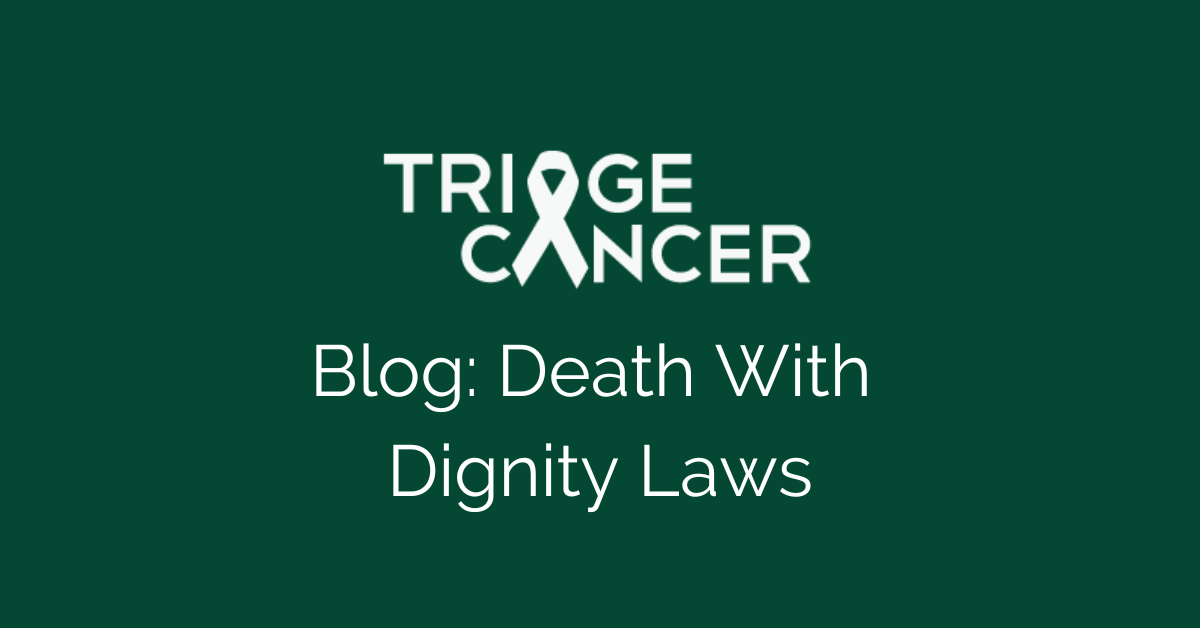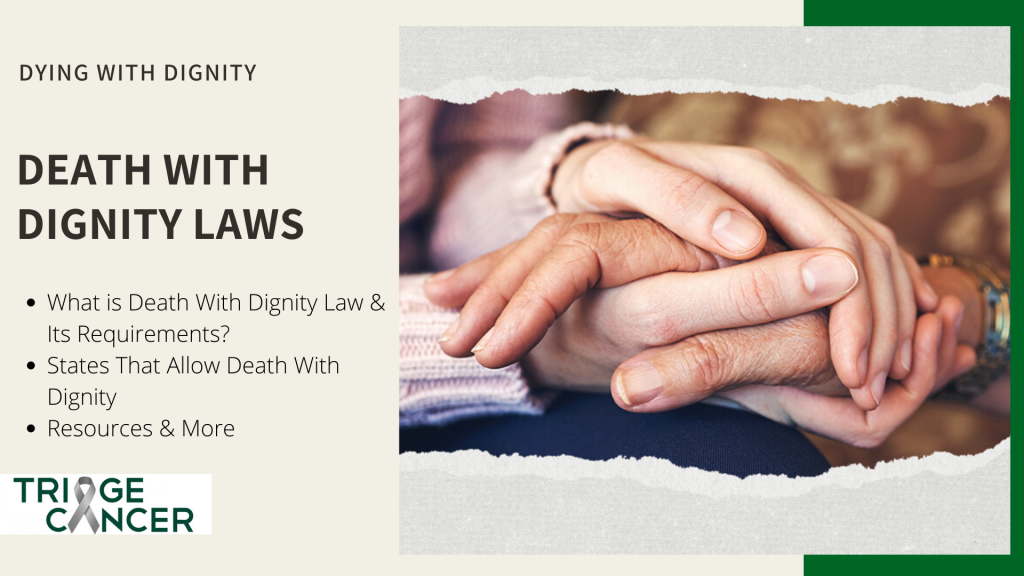
26 Mar Death with Dignity Laws
Table Of Contents:
- What are Death with Dignity Laws?
- Death with Dignity Law Requirements
- How does it benefit individuals with cancer?
- States that allow Death with Dignity Acts
- Advocating for Death with Dignity
People with life-threatening medical conditions, such as cancer, may face difficult end-of-life choices. Discussing end-of-life plans may be hard, but several states have expanded available options by enacting “Death with Dignity” laws. The purpose of this type of law is to provide greater autonomy to people with terminal illnesses when it comes to planning their end-of-life treatment and care.
What are Death with Dignity Laws?
Death with Dignity laws, also known as physician-assisted dying or aid-in-dying laws, allow certain terminally ill people to voluntarily and legally request and receive a prescription medication from their physician to hasten their death in a peaceful, humane, and dignified manner. These laws stem from the basic idea that individuals who are terminally ill should be the ones to make end-of-life decisions and determine how much pain and suffering they should endure, not the government.
How do individuals access and use death with dignity laws?
You must fulfill certain requirements to use the death with dignity protections under state laws:
- Be a resident of California, Colorado, the District of Columbia, Hawaii, Maine, New Jersey, New Mexico, Oregon, Vermont, or Washington;
- Qualify for a prescription under physician-assisted dying laws;
- Be 18 years of age or older;
- Be mentally competent and able to communicate to your health care team; and
- Be diagnosed with a terminal illness that will, within reasonable medical judgment, lead to death within six months.
How does this option benefit individuals with cancer?
By adding a voluntary option to the continuum of end-of-life care, these laws give patients dignity, control, and peace of mind during their final days with family and loved ones.
One of the most important assertions made by advocates for death with dignity laws is that those who assist individuals in these limited circumstances, and those who take the drugs to aid in their own death, are not considered to be engaging in suicide, homicide, or assisted suicide.
This distinction is particularly important to ensure that participating individuals do not face criminal charges and that individuals who choose to end their lives within these parameters will still be eligible for insurance benefits (i.e., life insurance).
- Doctors are NOT required to prescribe the life-ending medications – they can decline
- If your doctor declines, you can certainly find a new physician who is supportive of your choice
Deathwithdignity.org also gives guidance on how to find a doctor who participates.
States that have Death with Dignity (Allow Assisted Death) laws and legislation:
- California (End of Life Option Act; approved in 2015, in effect from 2016)
- Colorado (End of Life Options Act; 2016)
- District of Columbia (D.C. Death with Dignity Act; 2016/2017)
- Hawaii (Our Care, Our Choice Act; 2018/2019)
- Maine (Maine Death with Dignity Act; 2019)
- New Jersey (The New Jersey Medical Aid in Dying for the Terminally Ill Act; 2019)
- New Mexico (Elizabeth Whitefield End of Life Options Act; 2021)
- Oregon (Oregon Death with Dignity Act; 1994/1997)
- Vermont (Patient Choice and Control at the End of Life Act; 2013)
- Washington (Washington Death with Dignity Act; 2008)
- Montana does not currently have a statute safeguarding physician-assisted death. In 2009, Montana’s Supreme Court ruled nothing in the state law prohibited a physician from honoring a terminally ill, mentally competent patient’s request by prescribing medication to hasten the patient’s death. Since the ruling, several bills have been introduced to codify or ban the practice, none of which have passed.
Advocating for Death with Dignity Acts
From time to time, various states propose legislation or try to pass death with dignity laws through voter propositions. To keep track of what is happening in your state and to engage in advocacy around death with dignity legislation, visit Triage Cancer's advocacy resources.
For more information about estate planning, including medical decision-making, visit Triage Cancer's Estate Planning and End-of-Life Care resources, including our free State-Specific Estate Planning Toolkit and Estate Planning webinar.
About Triage Cancer
Triage Cancer is a national, nonprofit providing free education to people diagnosed with cancer, caregivers, and health care professionals on cancer-related legal and practical issues. Through events, materials, and resources, Triage Cancer is dedicated to helping people move beyond diagnosis.
We're glad you find this resource helpful! Please feel free to share it with your communities or to post a link on your organization's website. However, this content may not be reproduced, in whole or in part, without the express permission of Triage Cancer. Please email us at info@TriageCancer.org to request permission. © 2023 Triage Cancer



